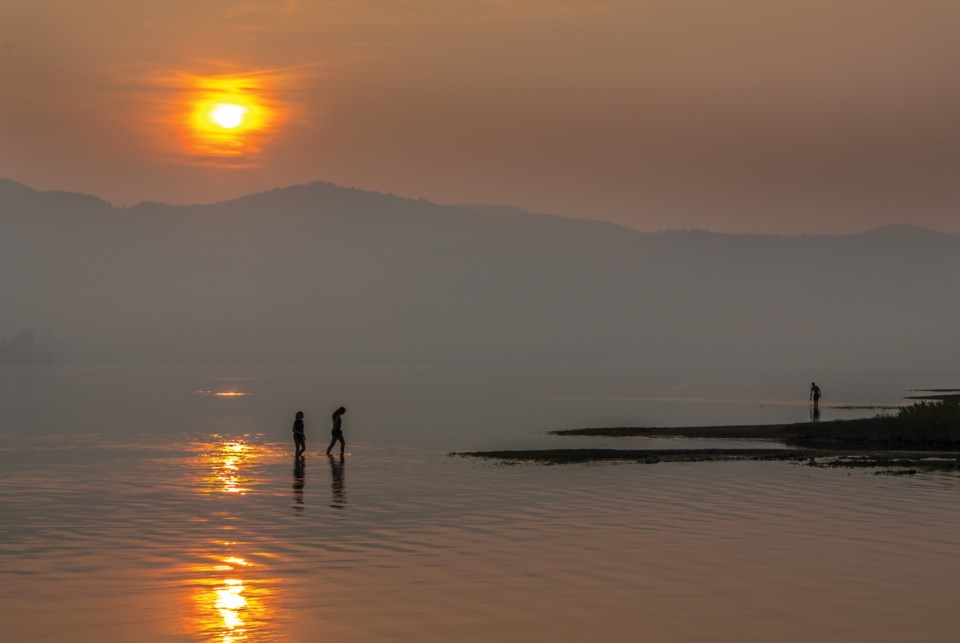Smoky skies continued this week to cause air quality and visibility concerns on the Sunshine Coast.
“Anecdotally, staff at Sechelt Hospital say they’ve seen a slight increase in the number of people presenting to the emergency department with respiratory issues during the ongoing air quality advisory,” Vancouver Coastal Health public affairs officer Matt Kieltyka told Coast Reporter. The most affected people are those in vulnerable populations, such as young children with asthma and adults with chronic respiratory conditions.
The smoke has also created problems for air transport. Erin White, manager of Sunshine Coast Air, said the company cancelled flights Monday, Aug. 20. She said the unpredictability of the blowing smoke means it’s been difficult for pilots and staff to predict when and whether flights will take off from Sechelt. “It’s meaning we’re really busy rearranging for people,” White said.
Randy Wright, president at Harbour Air, has been encountering similar problems. “We grounded the aircraft as of noon yesterday for the whole Coast,” he said Tuesday, adding that visibility is the main concern. He said despite the unusual August smoke – something he hasn’t encountered in his 20-year career – it’s been a good year for tourism. Still, he added, “we can’t control the smoke. So we’ll hope that the firefighters make headway and we get some rain.”
According to Ben Weinstein, air quality meteorologist with the BC Ministry of Environment, there is a slim chance of rain for the region within the next few days, but it will mostly be scattered showers. In the meantime, air quality continues to be a major concern.
Environment Canada updated its special air quality statement on Aug. 21, issuing another smoky skies bulletin for the Sunshine Coast from Gibsons to Earls Cove. The 24-hour average fine particulate matter count measured at Gibsons Municipal Hall was at 57.2 Tuesday, down from a spike of 78.2 on Monday, but still well above the objective of 25. Weinstein said the Coast’s Air Quality Health Index is in line with Metro Vancouver’s at high.
Weinstein said the Coast has been suffering from poor air quality because of a ridge of high pressure that has been sitting overtop B.C. “It was acting like a lid in a sense on the dispersion of air pollution,” he said from his office in Smithers. “It was basically trapping everything inside.”
In addition, weak surface winds were blowing from the central interior and bringing wildfire smoke with it. “All the smoke from all of B.C. was blowing towards the Lower Fraser Valley and Southern Vancouver Island,” he said.
Just as with last week, Coast residents could see skies clear up Thursday or Friday, when the high pressure ridge is expected to flatten and a surface low pressure system will be sliding down the province from north to south, bringing some precipitation. As the low pressure moves from west to east, it will stir up the air, with winds expected to blow from the same direction, taking the smoke along with it.
That change could happen in the next few days; however, Weinstein did note that smoke remains in the air out in the ocean, so it could take extra time to clear.
“Thursday should be the beginning of the break for people in your part of the province,” he said.
Meanwhile, his office in Smithers is getting a particulate matter count of 400. “I can actually feel it. I think this is the first time where I have a feeling in my chest that it’s pretty smoky out there,” Weinstein said, adding that it smells like a campfire indoors.
Despite the smoky air, recreation activities, at least those planned by the Sunshine Coast Regional District (SCRD), are continuing unhindered. Cecilia Garcia, communications officer with the SCRD, said all recreation activities “are running as usual,” and that “nothing has been affected by air quality.”
Dr. Geoff McKee, medical health officer for the Sunshine Coast, told Coast Reporter that seniors and those with pre-existing medical conditions and respiratory conditions should make sure their medication is up to date and on hand. Those with more severe reactions, such as shortness of breath and chest pain, should seek medical attention.
If necessary, people should stay indoors with good air circulation and no indoor air pollution. “I would say listen to your body. If it looks hazy out and if it looks smoky, that’s a good indicator that you may want to consider adjusting your activities for the day,” McKee said.
For updates on air quality information, visit www.bcairquality.ca



